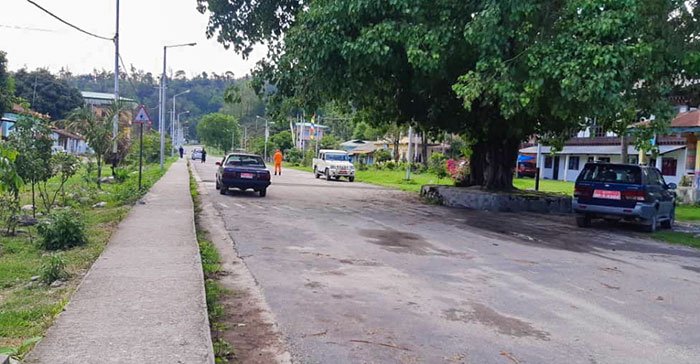Strict restrictions to continue for a week
Younten Tshedup
It was a grueling 10 hours for many Bhutanese who were closely watching the developments in Jomatshangkha after a shopkeeper tested positive for coronavirus on the rapid diagnostic test conducted on April 30 night.
The fear was of a possible case of a community infection, as the suspect had no travel history. When the health minister informed the nation about the possible case around 2:20pm, the swab samples taken from the throat had reached Wamrong, Trashigang.
By 10:15pm, to the relief of thousands watching closely, the results of further test conducted on the reliable PCR machine at the Mongar regional referral hospital came out negative.
“I went to bed with a huge relief,” said a teacher in Jomotshangkha who was closely following Kuensel. “I had been receiving calls and messages from friends and relatives all over the world. I was happy to share the good news immediately.”
The quiescent settlement of Jomotshangkha drungkhag in Samdrupjongkhar, cut off from the rest of the country, was in a state of unrest soon after the first result went public. Strict restrictions on movement of people were imposed as a preventive measure.
The drungkhag will still be closely monitored for a week, according to the Prime Minister’s Office who shared the information on its social media page.
The 55-year-old shopkeeper from Langchenphu gewog in the drungkhag had tested positive to Covid-19 on the rapid diagnostic test on April 30.
The suspect’s wife and son tested negative on the rapid diagnostic test.
With borders closed for more than two months now, residents of the otherwise self-isolated border town became apprehensive after the news of his initial testing. The man operates a “grocery cum bar” shop in Jomotshangkha town. According to sources, with poor business after the closure of the border, the man had gone back to his village and it was his son running the shop most of the time.
High-risk community surveillance
On April 29, a three-member technical advisory group (TAG) for Covid-19 from the health ministry arrived in Jomotshangkha, considered a high-risk community, to carry out the risk assessment and sensitisation.
Following field visits and providing awareness in the three gewogs, the TAG team started testing samples at Jomotshangkha hospital around 9pm on April 30. Around 10:30pm, of the 37 samples tested, one tested positive for IgM antibody. Officials from the ministry said that the rapid test was repeated six times that yielded the same result, positive.
To check for cross-reaction, tests were performed for other diseases including dengue, HIV, scrub typhus, hepatitis B (HBsAg) and hepatitis C (HCV), among others. All the tests were negative.
The team conducted 60 rapid diagnostic tests in the drungkhag in two days.
Officials said that if the RT-PCR test was positive, an emergency meeting would have been called to discuss the evacuation of the index case and deployment of security forces in the town and villages.
Restriction
As of yesterday afternoon, to ensure strict restriction and home quarantine, DeSuup, police and volunteers were deployed in the town and villages for patrolling and monitoring. As a precaution, strict restrictions on movement in and out of the drungkhag will continue for a week.
Health Minister Dechen Wangmo during a press briefing yesterday said that the ministry is conducting surveillance in the high-risk communities especially in the border areas.
She said that while 60 people had contacted with the patient, there could be about 1,900 people who could have come in contact with him since he is a shopkeeper. “This is why we have asked the people there to stay indoors for now.”
Lyonpo said that should this be a case of community transmission, the ministry already has protocols in place. Earlier, the minister had said that should the country enter a Red Zone in the event of community transmission, there is a Red Zone contingency plan in place.
She said that a Red Zone situation could come in multiple phases – cluster, district, region or the whole country lockdown. “The idea is to break the link of transmission. Based on this, respective agencies have already prepared.”
Positive case abroad
Meanwhile, Foreign Minister Dr Tandi Dorji during the press briefing said that there are 12 confirmed people outside the country who have tested positive to Covid-19. The recent case involved a 36-year-old man in Abu Dhabi, the capital of UAE.
Lyonpo said that of the total, five have recovered including the Bhutanese in London, Czech Republic and Mumbai.
On neighbouring towns of Bongaigoan in Assam and Alipurduar in West Bengal declaring red and orange zones respectively, Lyonpo Dr Tandi Dorji said that irrespective of the changing threat level outside, Bhutan should consider all to be Red Zone.
“Knowing the risks from outside, we have closed all our borders from the beginning. Now with more regions declaring Red Zone, we’ll have to further step up our response and containment efforts henceforth.”


